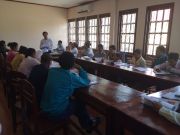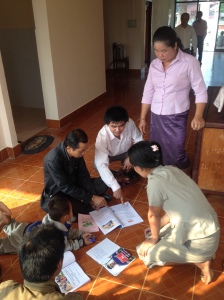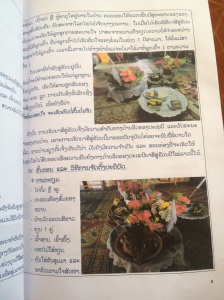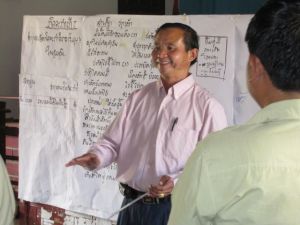MCC Laos has been working with 10 schools in the district of Tha Thom, Xieng Khouang province on implementing local wisdom and life skills training into the school’s curriculum. After a series of workshops with the school directors, teachers, and local wisdom educators to share ideas and develop training manuals, staff from the MCC joined and supported the last stage of the workshops where participants discussed how to use the manual. In co-operation with the district partners and by request of the provincial trainer, Soundeuan Simsamay the MCC team has been supporting this project to improve quality of education in the district.
MCC began working on local wisdom projects in the district in 2010, starting to 5 schools in implementing local wisdom teaching and have recently begun Phase II of the project and scaled up to 10 schools.

Aajaan Soundeuan Simsamay shares with workshop participants about how to create an activity plan for implementing local wisdom in their schools and discusses different teaching methods using the new training manual
Aajaan (Teacher) Soundeuan Simsamay is the director of the Arts and Sports sector in the Education Department for Xieng Khouang province in Lao P.D.R. He is also a member of the Education Quality Committee for the province that is aiming to improve education through introducing local wisdom and life skills into the school’s curriculum. Soundeuan has been working in education for the past 33 years; he began his career as a local teacher in Xieng Khouang for 9 years and after that has become responsible for supervising and training teachers in the implementation of local wisdom and life skills. Describing his process, Soundeuan starts by meeting with the teachers, directors and farmers to gather their ideas and share his own experiences about topics that have worked well for local wisdom lessons. He works closely with them to establish what the important local wisdom topics are for their community so he can help train them how to collect more information about their selected topics, how to create a teaching manual and then how to use and share that manual in their practice.

Local teachers, school directors and community educators are split into their separate schools at the workshop to plan together about the schedule for implementing local wisdom activities this year
Soundeuan recalled when the government began thinking about how to incorporate local wisdom and culture in community education in 1992. At that time Xieng Khoung province struggled with the remnants of many “bombies” or UXO’s (unexploded ordinance) left over from the Vietnam War, experienced as the “Secret War” in Laos, now the most heavily bombed country in the world. Teachers were including lessons to teach the students what to do when they came across the bombies and how to handle the situation to ensure the student’s safety, as many people were continuing to be impacted by unexploded bombs through the course of normal daily activities.
Through creating books and training materials for the youth about the dangers of UXO’s, the department of education was inspired to continue building the life skills and practical knowledge of the students. The government developed a policy in 2000 to formally begin implementing this program, making 20% of curriculum at schools available for local wisdom activities; but it’s been up to the individual schools to decide how and what that looks like in their local context. Currently four of the seven districts in XIeng Khouang province are incorporating local wisdom and life skills into their classes, with a provincial focus on agro-biodiversity. Topics include protecting natural resources, learning about the history and geography of the local community, foraging skills, taking cuttings from trees and plant propagation, as well as a variety of cultural practices, traditions, handicrafts and making local products. Soundeuan says they are aiming to have all seven districts in the province actively teaching local wisdom, and have a completed a training manual by 2017, when they will compile all the district resources into a provincial manual, used to help train other provinces and districts in the implementation of local wisdom.
Soundeuan spent 4 years teaching local wisdom classes himself about cultural traditions and the conservation and sustainable use of the communities’ natural resources. He observed that in the past, teachers only used to use the curriculum provided to them by the Ministry of Education, even though some topics didn’t always translate well into that local community context. For example, the textbook might be explaining about That Luang festival, but many of the students have never even seen That Luang (a temple in Vientiane city), and were not able to relate to the information. They were also not learning as much about the history and cultural practices of their own village and community. With the implementation of local wisdom into the curriculum, students aren’t as likely to lose their cultural values and practices, and members of the community see increased value in education as they have more co-operation with the schools to improve the education of their children. Farmers and community members are happy to be included in providing training and practical skills at schools as it values their knowledge and skills, communally validating the importance of their work and allowing them an opportunity to share their experience with future generations.

The training manual with a list of topics and activities from the 5 local school’s MCC is working with in Tha Thom, compiled by Aajaan Soundeuan Simsamay in early 2014
Soundeuan also observed that before, many of the teacher’s were only using oral teaching to deliver lectures, and didn’t incorporate creative activities to keep the student’s attentive in class. His training with teachers, school directors, farmers, community members and district staff has helped build the capacity and imagination of the educators to provide more dynamic, relevant, and community-based education to their local children that benefits everyone. For the future he hopes to continue developing more curriculum manuals for teachers to use, as the knowledge base and ideas increase and the information is continually revised to fit the local context. He is passionate about promoting a rich cultural heritage and life skills in youth, and would like to continue providing training to teachers and other districts and provinces if they need help and want to share ideas and practices.

